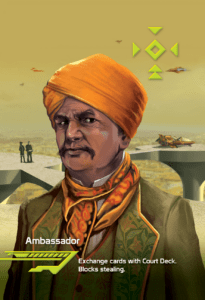Coup is a social deduction card game designed by Rikki Tahta and was published by Indie Boards & Cards and La Mame Games in 2012. Its subject matter may be a little mature for very young kids, but its relatively simple rules and procedure make it a game fit for older kids and up. Much of the magic comes from the number of starting cards in hand, that being two. This healthy amount serves multiple purposes to structure a social deduction environment that’s both approachable to new players and meaningfully complex.
During the game, no one sees what cards other players have; they must deduce this information from the claims other players make as they play. Players have direct incentive to do this precisely because other players can lie, and challenges to their actions can hasten their expulsion from the game. Since each player starts with only two cards, keeping track of what players have is very feasible, which quickly allows for new players to get their memories involved and not be too behind more experienced players. This contrasts from a game such as Among Us, which is a lovely game, but has many new players significantly disadvantaged against old ones due to the complexity of the maps. This puts new players in a more passive role in the deduction mechanics. Coup’s two cards along with a helpful reference sheet keep new players from being too overwhelmed and allows them to be far more active in deduction, potentially after their very first game.
The starting hand count also balances well with the abilities those cards have to make passing turns satisfyingly complicated to both take and track. All of the cards have unique skills that are very strong but fairly limited to specific scenarios. For example, the Contessa is great to have when there are plenty of Assassins at play but isn’t very active during more conservative periods. The Ambassador is more flexible with two functions: blocking stealing and essentially allowing a hand redo. However, these defensive abilities won’t be much good when others are on the offense. Since opponent cards can change, players are incentivized to keep track not only to reliably challenge but also to determine how useful their hand is. Two cards keeps any one player from being ready for anything, and they’ll have to pay close attention to what others may or may not have to decide the next best course of action. Multiple cards also adds a lot of psychological texture to the game since players can more easily lie about what cards they have in order to misportray the game state, which can influence other players to adapt (potentially to their disadvantage). However, players must be cautious since two cards gives them far less leeway to lie than three, which would definitely be too flexible. Such a number would make players too capable and give them less incentive to lie since their strategy would probably be serviceable by the cards that have.


Another important aspect of the number two is that cards also act as the players’ health. This dramatically influences the challenge action, the context of which is dynamically evolving as the game proceeds. In the beginning, no one knows what cards anyone else has. This makes a foolhardy challenge very risky since a wrong call will cut the challenging player’s health in half. Furthermore, cards directly extend the capabilities of a player, so such a call would also result in a clear strategic disadvantage when there’s still a lot of game to go. This effectively makes the beginning of the game the “lying” phase, granting players a lot more freedom in their actions but also sets the stage for the midgame since they’ll have to maintain any lies they make. Players will be way more inclined to challenge once a few turns have passed and information has been gathered. The social deduction takes on a new flavor, however, after multiple rounds pass since players will be able to get a feel for other players, which incentivizes change in the game’s evolution. Players may feel more confident that other players are lying based on behavior displayed in past games, which may make the “lying” phase of the game more turbulent in later rounds. Two cards certainly allows this behavior since even though the odds are good to have any one card, two cards doesn’t let everyone have everything, so a good vibe check at the beginning can greatly influence the outcome of the current game (and even later rounds).



